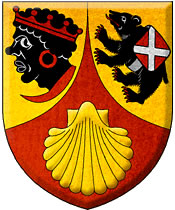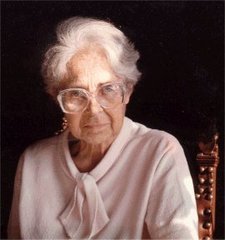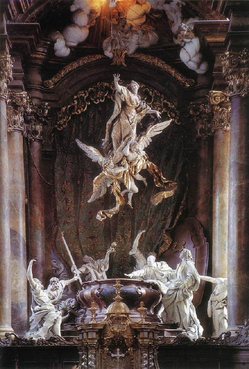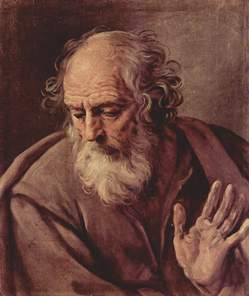The Holy Father gave the following address to the Social Sciences Academy which is led by Mary Ann Glendon. It is a rather important speech with regard to faith and reason and it deserves our serious attention. As supplementary readings you might re-read the Pope’s 2008 address to the United Nations and an essay by Tracey Rowland, “Natural Law: From Neo-Thomism to Nuptial Mysticism” in the journal Communio 35 (Fall 2008).
As you gather for the fifteenth Plenary Session of the Pontifical
Academy of Social Sciences, I am pleased to have this occasion to meet with you
and to express my encouragement for your mission of expounding and furthering
the Church’s social doctrine in the areas of law, economy, politics and the
various other social sciences. Thanking Professor Mary Ann Glendon for her
cordial words of greeting, I assure you of my prayers that the fruit of your
deliberations will continue to attest to the enduring pertinence of Catholic
social teaching in a rapidly changing world.
After studying work, democracy, globalisation, solidarity
and subsidiarity in relation to the social teaching of the Church, your Academy
has chosen to return to the central question of the dignity of the human person
and human rights, a point of encounter between the doctrine of the Church and
contemporary society.
The world’s great religions and philosophies have
illuminated some aspects of these human rights, which are concisely expressed
in “the golden rule” found in the Gospel: “Do to others as you
would have them do to you” (Lk 6:31;
cf. Mt 7:12).
The Church has always affirmed that fundamental rights, above and beyond the
different ways in which they are formulated and the different degrees of
importance they may have in various cultural contexts, are to be upheld and
accorded universal recognition because they are inherent in the very nature of
man, who is created in the image and likeness of God. If all human beings are
created in the image and likeness of God, then they share a common nature that
binds them together and calls for universal respect. The Church, assimilating
the teaching of Christ, considers the person as “the worthiest of
nature” (St. Thomas Aquinas, De potentia, 9, 3) and has taught that the ethical
and political order that governs relationships between persons finds its origin
in the very structure of man’s being. The discovery of America and the ensuing
anthropological debate in sixteenth- and seventeenth-century Europe led to a
heightened awareness of human rights as such and of their universality (ius
gentium). The modern
period helped shape the idea that the message of Christ – because it proclaims
that God loves every man and woman and that every human being is called to love
God freely – demonstrates that everyone, independently of his or her social and
cultural condition, by nature deserves freedom. At the same time, we must
always remember that “freedom itself needs to be set free. It is Christ
who sets it free“ (Veritatis Splendor, 86).
In the middle of the last century, after the vast suffering
caused by two terrible world wars and the unspeakable crimes perpetrated by
totalitarian ideologies, the international community acquired a new system of
international law based on human rights. In this, it appears to have acted in
conformity with the message that my predecessor Benedict XV proclaimed when he
called on the belligerents of the First World War to “transform the
material force of arms into the moral force of law” (“Note to the
Heads of the Belligerent Peoples”, 1 August 1917).
Human rights became the reference point of a shared
universal ethos –
at least at the level of aspiration – for most of humankind. These rights have
been ratified by almost every State in the world. The Second Vatican Council,
in the Declaration Dignitatis Humanae, as well as my predecessors Paul VI and John Paul II,
forcefully referred to the right to life and the right to freedom of conscience
and religion as being at the centre of those rights that spring from human
nature itself.
Strictly speaking, these human rights are not truths of
faith, even though they are discoverable – and indeed come to full light – in
the message of Christ who “reveals man to man himself” (Gaudium et
Spes, 22). They receive
further confirmation from faith. Yet it stands to reason that, living and
acting in the physical world as spiritual beings, men and women ascertain the
pervading presence of a logos which
enables them to
distinguish not only between true and false, but also good and evil, better and
worse, and justice and injustice. This ability to discern – this radical agency – renders every person capable of
grasping the “natural law”, which is nothing other than a
participation in the eternal law: “unde…lex naturalis nihil aliud est quam
participatio legis aeternae in rationali creatura“ (St. Thomas Aquinas, ST I-II, 91, 2). The natural law is a
universal guide recognizable to everyone, on the basis of which all people can
reciprocally understand and love each other. Human rights, therefore, are ultimately
rooted in a participation of God, who has created each human person with
intelligence and freedom. If this solid ethical and political basis is ignored,
human rights remain fragile since they are deprived of their sound foundation.
The Church’s action in promoting human rights is therefore
supported by rational reflection, in such a way that these rights can be
presented to all people of good will, independently of any religious
affiliation they may have. Nevertheless, as I have observed in my Encyclicals,
on the one hand, human reason must undergo constant purification by faith,
insofar as it is always in danger of a certain ethical blindness caused by
disordered passions and sin; and, on the other hand, insofar as human rights
need to be re-appropriated by every generation and by each individual, and
insofar as human freedom – which proceeds by a succession of free choices – is
always fragile, the human person needs the unconditional hope and love that can
only be found in God and that lead to participation in the justice and
generosity of God towards others (cf. Deus Caritas Est, 18, and Spe Salvi, 24).
This perspective draws attention to some of the most
critical social problems of recent decades, such as the growing awareness –
which has in part arisen with globalisation and the present economic crisis –
of a flagrant contrast between the equal attribution of rights and the unequal access to the means of attaining those
rights. For Christians who regularly ask God to “give us this day our
daily bread”, it is a shameful tragedy that one-fifth of humanity still
goes hungry. Assuring an adequate food supply, like the protection of vital
resources such as water and energy, requires all international leaders to
collaborate in showing a readiness to work in good faith, respecting the
natural law and promoting solidarity and subsidiarity with the weakest regions
and peoples of the planet as the most effective strategy for eliminating social
inequalities between countries and societies and for increasing global
security.
Dear friends, dear Academicians, in exhorting you in your research and deliberations to be credible and consistent witnesses tot he defence and promotion of these non-negotiable human rights which are founded in divine law, I most willingly impart to you my Apostolic Blessing.




